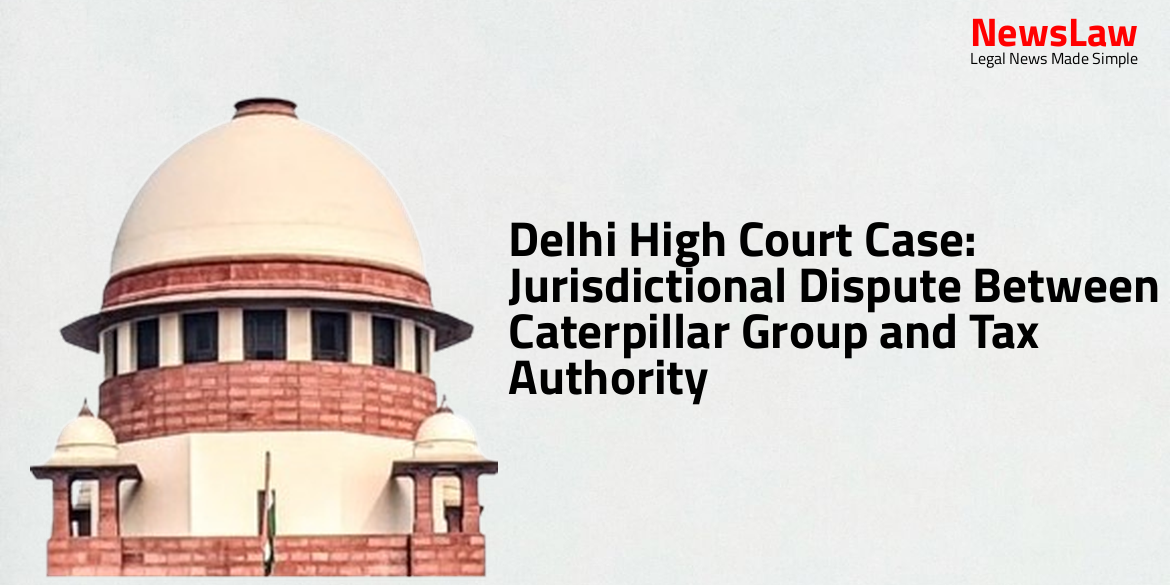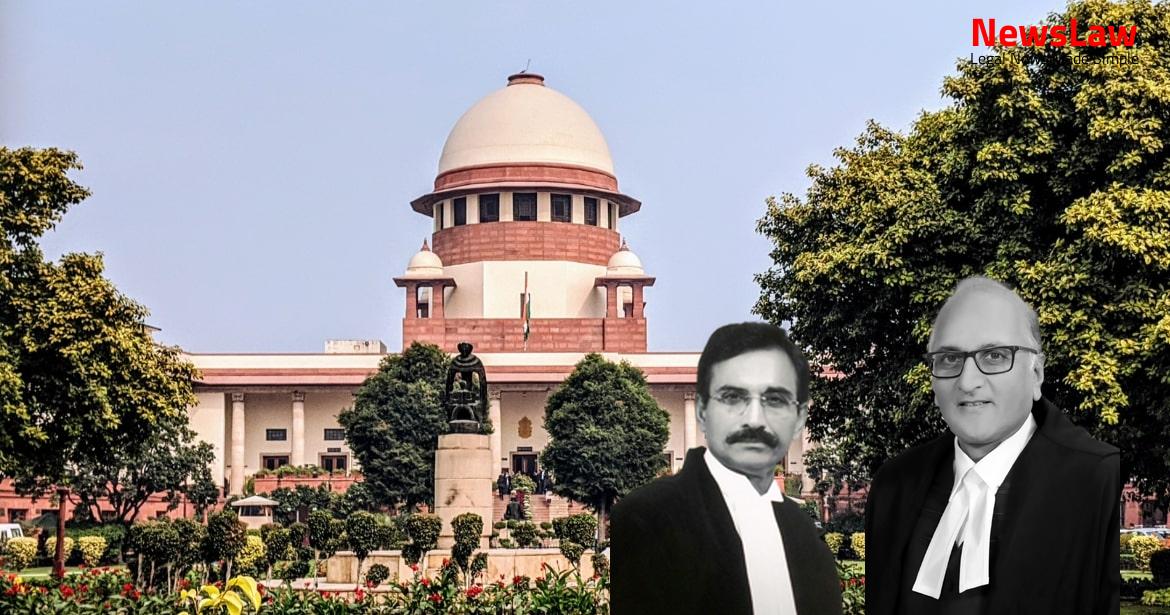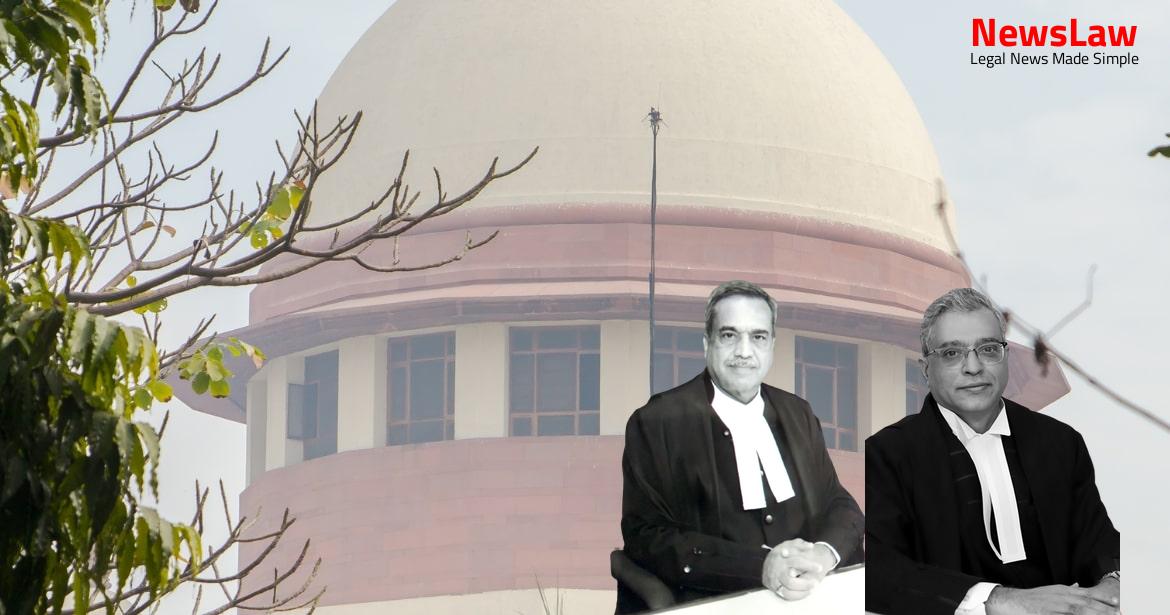In a significant case before the Delhi High Court, a jurisdictional dispute between the Caterpillar Group and the Tax Authority has been resolved. The dispute revolves around the concept of Permanent Establishment in relation to international transactions. The court’s ruling clarifies the interpretation of the term ‘permanent establishment’ in tax laws, impacting the assessment of taxable income for the involved parties.
Facts
- The petitioner is a foreign company registered in the United States of America and part of the Caterpillar Group.
- The main international transaction is the provision of technical support services.
- The wholly owned Indian subsidiary of the petitioner, Progress Rail Innovations Private Limited (PRIPL), was incorporated in 1996 and had a manufacturing unit at Noida and an office at Varanasi during the relevant assessment years.
- PRIPL has been regularly assessed for tax in Delhi and subjected to transfer pricing assessments.
- The first respondent initiated reassessment proceedings based on the finding that PRIPL constitutes a Fixed Place Permanent Establishment, a Service PE, and a Dependent Agent Permanent Establishment.
- The petitioner contests the assumption of jurisdiction and reasons for reassessment.
- The international transactions entered into by the assessee are listed.
- The petitioner questioned the assumption of jurisdiction and the reasons for reassessment in its response.
- The first respondent issued notices of reassessment based on a report that found a PE existed through PRIPL.
- The petitioner responded to the Section 148 notice stating it had not earned taxable income.
- The supplies made to Indian Railways are through imports filed against Bills of Entries.
- The Security Premium on Equity Shares alloted was analyzed using another method.
- The functions of EMD India, the petitioner’s subsidiary, include monitoring tenders, providing technical support, and coordinating with Indian Railways.
- The petitioner asserts that its core business activities are different from those of its Indian subsidiary, PRIPL, which manufactures distinct products.
Issue
- In order to answer the fundamental question of whether a PE came into existence within the territorial area of EMD Locomotive Technology Pvt. Ltd., the power conferred by Section 148 of the Act needed to be examined.
- The risk and responsibility involved in the delivery of goods must be determined in relation to either EMD Locomotive Technology Pvt. Ltd., Noida or Electromotive Diesel Inc., USA.
Arguments
- Learned senior counsel, Mr. Datar, argued that the Noida premises cannot be considered a virtual projection of the holding company.
- Interrelated transactions were conducted at arm’s length and independently assessed in transfer pricing studies.
- The services performed by the Indian subsidiary were identical to those in E-Funds IT Solutions Inc. and jurisdiction was illegally assumed under Sections 147/148 of the Act.
- Prima facie view or recorded reasons for income escaping assessment were missing in the impugned notices.
- The judgement of Formula One World Championship vs. CIT was relied upon to challenge the notices.
- The first respondent did not base their action on material establishing the principal function of the Indian subsidiary in relation to contracts with Indian Railways.
- All products were directly supplied to Indian Railways by the petitioner in the relevant assessment years.
- Judgments in Samsung Heavy Industries and E-Funds IT Solution Inc. were referred to regarding PE question.
- The assumption of jurisdiction claiming Noida factory is a Fixed Place PE was disputed.
- The first respondent incorrectly proceeded assuming the Indian subsidiary constituted a PE.
- The Indian subsidiary played no role in activities approved by the petitioner, as per Mr. Datar.
- The Transfer Pricing Officer’s examination did not recognize the Indian subsidiary as a PE.
- The argument that PRIPL constituted a DAPE was contested by Mr. Datar.
- The first respondent did not express a prima facie view on the petitioner having a PE in India.
- The migration of PAN for reassessment under the first respondent’s jurisdiction was criticized.
- The core business activities of the petitioner were contended not to be at Noida or Varanasi.
- Distinct products were manufactured by the petitioner and Indian subsidiary, as highlighted by Mr. Datar.
- Observations from TPO’s report were cited by the petitioner to support their case.
- Supporting documents and assumptions did not evidence core business activities at Noida or Varanasi.
- Response from Mr. Potnuru regarding communication with DLW, Varanasi and Indian Railways was referred to.
- Jurisprudence from Formula One World Championship vs. CIT and CIT vs. Vishakhapatnam Port Trust were mentioned.
- Argument regarding existence of PE in India and income attribution based on sales was presented.
- Legal position from Morgan Stanley case on preparatory or auxiliary services was invoked.
- View taken by first respondent on Fixed Place PE was deemed erroneous and untenable.
- Supreme Court rulings emphasized on the mere existence of a wholly owned subsidiary not instantiating a PE.
- The entire action was based on a survey in the factory and office premises of the Indian subsidiary at Noida and Varanasi.
- Mr. Agarwal cited the decision in E-Funds IT Solutions Inc. to argue that the Indian subsidiary’s activities did not fall within the provision of India-USA DTAA.
- Mr. Agarwal distinguished the decision in E-Funds IT Solutions Inc. and Samsung Heavy Industries Limited, stating they were not applicable to the present case.
- Mr. Datar questioned the fairness of the action taken based on selective extraction of statements from the petitioner.
- It was argued that the activities of the subsidiary for the petitioner did not meet the test of being carried out wholly or almost wholly for the petitioner.
- Article 5(4) of the DTAA required the Indian subsidiary to both have the authority to conclude contracts and habitually engage in acting on that authority, which was not found by the respondents.
- Article 5(6) of the India-USA DTAA clarified that the mere existence of a wholly owned subsidiary does not constitute a PE.
- Mr. Datar referred to an opinion in Speciality Magazines P. Ltd. regarding the interpretation of ‘wholly’ and ‘almost wholly’ in the context of income percentage.
- It was argued that even if the Indian subsidiary was considered a PE, jurisdiction for reassessment should lie with the New Delhi Assessing Officer.
Analysis
- The term ‘permanent establishment’ includes various types of physical locations or activities such as management place, branch, office, factory, workshop, mine, oil or gas well, warehouse, farm, plantation, sales outlet, etc.
- Certain activities or locations are specifically excluded from the definition of ‘permanent establishment’ including usage of facilities only for storage or occasional delivery of goods, maintenance of stock for storage or display, maintenance of fixed place for purchasing goods, maintenance of business place for advertising or auxiliary activities.
- In certain cases, a person acting on behalf of an enterprise in a Contracting State can create a permanent establishment for the enterprise in that State based on specific conditions related to authority to conclude contracts, maintaining stock of goods, or securing orders.
- The presence of a broker, agent of independent status, or commission agent in a Contracting State, conducting business on behalf of an enterprise, does not automatically create a permanent establishment for the enterprise in that State.
- Control or business relationship between a company in one Contracting State and a company in the other Contracting State does not, by itself, constitute a permanent establishment for either company in the other State.
- The Andhra Pradesh High Court in Commissioner of Income Tax, Andhra Pradesh vs Vishakapatnam Port Trust explained the concept of a ‘permanent establishment’ as requiring a substantial presence of a foreign enterprise in another country.
- The Supreme Court in Samsung Heavy Industries Company Limited held that outsourcing services to India did not constitute a fixed place permanent establishment.
- The outsourcing of work to India in E-Funds IT Solution Inc. case was held not to give rise to a fixed place PE.
- The Full Federal Court found that a subsidiary substantially financed by loans from the parent was not a PE of the foreign parent.
- The presence had to meet the test of being enduring and of a permanent nature.
- The Supreme Court in Honda Motor Company Limited vs Assistant Director of Income Tax clarified that outsourcing work to India would not create a fixed place PE.
- The aspect of whether an Indian establishment performed preparatory or auxiliary functions was considered in National Petroleum Construction Co. case.
- The principles governing Fixed Place PE were elaborated by the Supreme Court in Formula One World Championship Limited.
- The meaning of the term ‘habitually’ in Article 5(4)(a) in relation to the authority to conclude contracts was discussed with reference to the OECD Commentary.
- The assumption of jurisdiction cannot be sustained.
- The opinion on the question of PE does not hold up on a prima facie basis.
- It was necessary for the Court to confirm the correctness or at least the plausibility of the decision on the question of PE.
- Without a decision against the petitioner on the PE question, the authority of the respondent would be undermined.
- The opinion as expressed by the respondent cannot be considered tentative or open for debate.
- The foundation of the impugned action is arbitrary and unsustainable.
- Due to the lack of a sustainable foundation, the reassessment proceedings should be quashed.
Decision
- The transfer of the PAN of the petitioner was solely to facilitate the first respondent conducting the reassessment.
- The jurisdiction of the PAN of the petitioner was transferred from the fourth to the first respondent, but this transfer shall stand quashed.
- The PAN mapping shall revert to the jurisdictional AO of the petitioner, namely, the DCIT/ACIT, International taxation, Circle 1(1)(1), Delhi.
- All rights and contentions of parties in that respect are kept open.
- The impugned notices issued under Section 148 on various dates in 2019 are quashed.
- The issue of whether the office of the petitioner in the Delhi Circle constitutes a PE will be examined independently by the respondents.
- The present writ petitions are allowed.
Case Title: PROGRESS RAIL LOCOMOTIVE INC.(FORMERLY ELECTRO MOTIVEDIESEL INC.) Vs. DEPUTY COMMISSIONER OF INCOME-TAX( INTERNATIONAL TAXATION),CIRCLE-NOIDA & ORS. (2024:DHC:4331-DB)
Case Number: W.P.(C)-12406/2019



